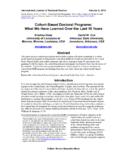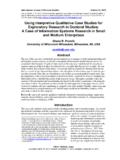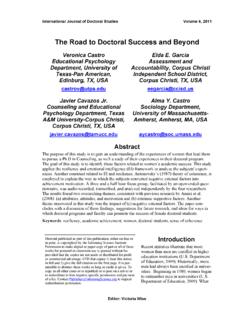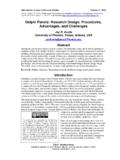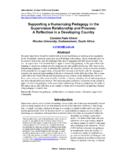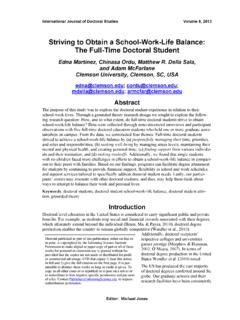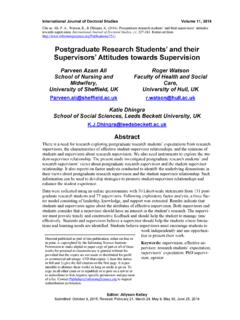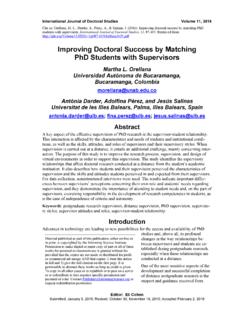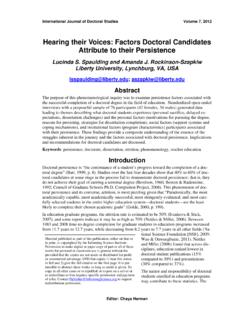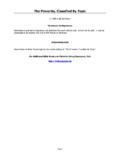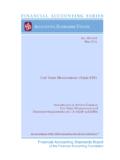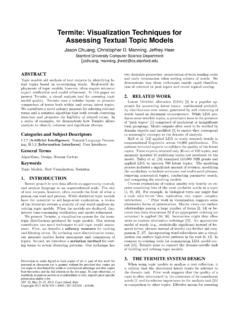Transcription of Selecting a Research Topic: A Framework for …
1 International Journal of doctoral Studies Volume 7, 2012. Selecting a Research Topic: A Framework for doctoral students Andy Luse, Brian Mennecke, and Anthony Townsend Iowa State University, Ames, IA, USA. Abstract This article provides an explanation of the process for Selecting a Research topic. The article uses Kuhn's classic work on scientific revolutions to delineate the steps in developing theoretical re- search within an area. The paper provides methods for preparing to develop a Research topic, steps for approaching a Research problem, as well as methods for problem theoretical develop- ment. We end the article with pitfalls that can occur when Selecting a Research topic as well as bright spots with regard to doctoral students beginning Research in an area.
2 Our hope is that this Research will help beginning doctoral students start the process of developing a Research topic by providing assistance with the overall process. Keywords: Research area, topic selection, Research type, theory development, Research quality Introduction Beginning academic Research is one of the most important activities for new doctoral students . While debated by many, the publish or perish mantra still has credence within the academic arena (De Rond & Miller, 2005). Good teaching may be rewarded locally, and it is a commendable pursuit in and of itself, but most tenure decisions and principles of recognition and prestige are dependent on publication (Bedeian, 1996). Publishing also carries some existential purpose by enabling individuals to leave their mark on the intellectual history of their respective discipline (De Rond & Miller, 2005).
3 Given the necessity and benefit of academic writing, it is imperative that doctoral students start this process as quickly as possible in their career. In their manuscript regarding the beginning of the publication process for doctoral students , Stoilescu and McDougall (2010) provide a much needed review for how doctoral students can start the process of publishing early in their academic careers. They provide a useful synopsis of the various steps involved in publishing Research , from initiating a project with an idea to submit- ting and revising the manuscript. One area that the article only briefly addresses is the process of identifying and Selecting Research topics . While overarching ideas of contribution to the field and the experiential background of the student are mentioned, very little guidance is given as to how to select a Research topic.
4 Many doc- Material published as part of this publication, either on-line or toral students do not have a Research in print, is copyrighted by the Informing Science Institute. focus, and even those who do may still Permission to make digital or paper copy of part or all of these works for personal or classroom use is granted without fee lack the experience needed to develop a provided that the copies are not made or distributed for profit specific topic within a broader Research or commercial advantage AND that copies 1) bear this notice area. in full and 2) give the full citation on the first page. It is per- missible to abstract these works so long as credit is given. To The focus of this article is to explore the copy in all other cases or to republish or to post on a server or process of Selecting a Research topic and to redistribute to lists requires specific permission and payment it is intended to function as a prequel to of a fee.
5 Contact to request redistribution permission. the work of Stoilescu and McDougall on Editor: Linda Knight Selecting a Research Topic publishing academic Research (2010). We provide a Framework based on the work of Kuhn in his popular work The Structure of Scientific Revolutions (1962). We also provide points on how to prepare for and select Research as a doctoral student. The remainder of this manuscript is format- ted in sections that help to provide one chronological method to the pursuit of relevant Research by the novice academic, supported by the writing of Kuhn. The first section provides introduc- tory techniques and reflections about how to put oneself into the proper mindset for identifying a Research topic. The second section describes how one should consider approaching a Research problem.
6 Methods of theory development are delineated in the third section. The fourth section describes pitfalls with respect to Research while the fifth describes some potential opportunities and benefits. Finally, conclusions are discussed. Changing Your Mindset When setting out to develop a Research project, many doctoral students begin by jumping straight to a solution to a problem before they have given the problem adequate thought or sometimes before they even have a well-defined problem at all. This is analogous to the way many novice decision makers approach unfamiliar problems; that is, they focus almost immediately on the so- lution while ignoring the fundamental steps involved in defining the problem and examining al- ternatives.
7 The difficulty this presents is that many students are not prepared to engage in the appropriate activities needed to adequately select a Research topic based on a defined problem. Before Selecting a viable Research topic, the individual should become ready mentally to fully engage in the exploration and development process, which can be a challenge for many new doc- toral students . One premise that any researcher must challenge is the acceptance of existing scientific dogma or paradigms (Kuhn, 1962). Many students are indoctrinated in the foundational theories in their discipline because, in essence, from the time of kindergarten students are socialized to accept what they read without significant critical evaluation of what is presented (Davis, 1971; Kuhn, 1962).
8 This training leaves the student inattentive to things to which they should be attentive (Davis, 1971) and traps the student in the routinized, take-it-for-granted way of viewing the world around them (Garfinkel, 1967). To prepare oneself for identifying a Research topic, a student should be willing to challenge previously held beliefs. While this can be difficult, there are some techniques that a student can use to foster creative thinking. 1. Brainstorming: When reading and reflecting on Research , write down ideas that may not make complete sense. (This points towards the usefulness of carrying a Research note- book in which ideas can be recorded.). 2. Outside the discipline: Try to think outside your discipline and training in your academic area.
9 This is often accomplished by questioning assumptions; that is, asking what would be true if we did not have any preconceptions or assumptions. 3. Partner: When thinking of a Research topic, run it by someone that is completely out of your area. A good idea is something that makes for a good story. If you can explain the idea to a layman or a person outside your field and have it make sense, it is more likely that your idea is logically sound. 4. Ask Why : Continually ask both yourself and others the question Why? By having a partner outside your area ask why, he or she may challenge some issues that you have taken for granted from within your discipline. 5. Talk about it: If you talk an idea through, you will find that you conceptualize the how's, the why's, the where's, the who's, etc.
10 Often we think we understand a problem, but talking about it forces us to piece loosely knit ideas into a cohesive package. 144. Luse, Mennecke, & Townsend 6. Drawing is fun and effective: While not all Research can be visualized, often concepts can be drawn. Graphical representations help you collapse complex ideas into manage- able nuggets that can be more easily understood. For most models, if you can draw it you can understand it. In addition, the very model that is drawn may raise new issues to be addressed. 7. Think of things you are interested in: These ideas could be within your area of Research or completely unrelated. Good Research starts with what the author is interested in, thus buffering against becoming discouraged and uninterested in the Research later in the proc- ess.
